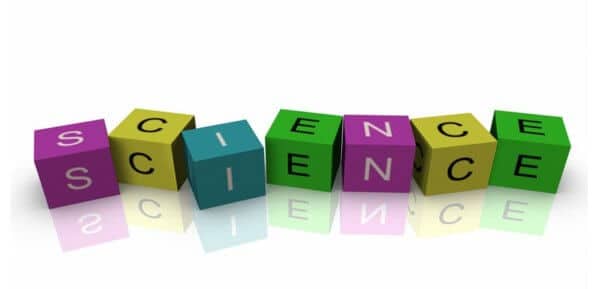
How many science words do you know in English? If your answer is “not many,” this needs to change. TOEFL Reading is full of science!
To quantify this, 32 of the 39 TOEFL Reading passages in the official ETS TOEFL books are science-focused. You can expect this kind of science dominance on test day too. To properly prepare for TOEFL Reading, then, you need to be comfortable reading about science in English.
The most TOEFL-like science readings out there can be found in first- and second-year university science textbooks. So if you can get your hands on these kinds of basic texts, they’re quite useful.
But of course, you probably want the convenience and affordability of Internet readings if possible. That’s why you’re looking for TOEFL prep advice on a website. You’re in luck. There are plenty of websites that can provide you with instant, free-of-charge science texts that have TOEFL-like vocabulary and sentence structure. Today, we’ll look at six especially good websites for TOEFL science reading.
#1: Mental Floss
My personal favorite source of TOEFL-like science resource is the website Mental Floss. Mental Floss’s science section has tons of TOEFL-level science articles. Mental Floss has several other science-related archives too. To learn more about Mental Floss’s various science content, check out this post:
#2: Smithsonian Magazine
If you haven’t heard of Smithsonian Magazine, you’ve really been missing out. Not only is this website a great source for TOEFL-like science passages, it’s also full of North American English academic texts, the exact kind you’ll see on the TOEFL.
Smithsonian Magazine should especially interest you if you’re planning to study in the Untied States. This website is sponsored by the U.S. Federal Government and is associated with the Smithsonian Museums in Washington D.C. Once you pass the TOEFL and come to America, you can visit the museums themse
Smithsonian Magazine has a special section for science and nature on its website. The Smithsonian’s biology-oriented approach to science makes for ideal TOEFL Science Reading practice. The TOEFL itself heavily favors life sciences over other kinds of science.
#3: National Geographic
National Geographic is another American institution, although not a government-sponsored one. Since the late 1800s, National Geographic has existed in print as a major source of educational writing and photography. In modern times, the National Geographic website continues to offer interesting science articles accompanied by gorgeous photos.
The science section of National Geographic has a more exciting journalist/travel guide tone to it, compared to the more formal academic “mood” of TOEFL Reading passages. And of course, real TOEFL passages aren’t illustrated with vivid, full-color photos. Still, National Geographic Science is an enjoyable way to develop on enthusiasm for science reading, while exposing yourself to TOEFL-level science vocabulary and TOEFL-appropriate science topics.
#4: Time Magazine
Time, like National Geographic, is a long-running print magazine that also sponsors online science content. Most of the articles on the Time Science web page deal with science-related current events. Writings on this website highlight recent scientific discoveries and the emergence of new scientific theories. You’ll also see political pieces related to climate change and government policies on science funding and research. The more politicized content is a lot less TOEFL-like than Time Science’s other news stories. But even these “policy” pieces contain TOEFL-level science vocabulary and can make for interesting reading practice.
#5: ScienceNews
Although “ScienceNews” has the word “News” in the title, this website avoids the very un-TOEFL-like “current events” tone that you often see in National Geographic and Time science passages.
In fact, the ScienceNews website is really great at presenting interesting but “timeless” science articles. It’s the same kind of valid-but-not-necessarily-recent science info that you see on the TOEFL itself.
Better yet, the editors of ScienceNews try to write science articles at a level that is understandable to ordinary high school graduates. This is the exact same level of science writing that the TOEFL aims for in its own science passages.
#6: Popular Science
If you look at the Popular Science website, it seems like an unlikely candidate for a list of TOEFL-like science sites. The articles are about as far from the TOEFL format as you can get. As I write this, PopSci’s top-trending articles are “19 Gift Ideas for the Space Nerd in Your Life,” “Now You Can Buy Gorgeous Furniture Made of Mushrooms,” “Watch the Chernobyl Disaster Site Finally Get Properly Contained” (a video), and “Lack of Sleep Could Cost Americans $411 Billion a Year.”
No, none of these articles are at all like something you’d see on the TOEFL. The content and format are all wrong, and so is the subject matter. The vocabulary in PopSci’s articles is hit and miss as well, where TOEFL prep is concerned.
So why did I include this website in my list? Well, this is all really fascinating, fun stuff, isn’t it? Not so TOEFL-relevant, but certainly relevant to your life. This is probably the best website for developing an interest in science, “buying in” to science as something you want to read and pay attention to. Being “sold” on an academic topic, finding your buy-in for a TOEFL topic, can really boost your performance on the exam. Interested test-takers tend to be successful test-takers.
Finding Other TOEFL Science Reading Practice On Your Own
While I’ve highlighted a few especially good websites, there are a lot of other enjoyable TOEFL-like science articles out there. If there’s already an English-language website you read a lot, a quick Google search of the website name and the word “science” will often pull up a lot of different articles you can read (ex: CNN science, BBC science). And if you still really want some beginner-level university textbooks once you’ve gone through some science websites, you can always purchase eBook versions of such texts instantly on websites like Amazon.com.
Takeaways
Reading a lot in English is one of the best ways to improve your TOEFL score and science writing on the TOEFL can be intimidating. These sites can help you develop those reading muscles that will power you to your score goal. Want to see how your reading practice is translating to test success? Take our free practice test today. Then consider a free trial of our Magoosh Premium Plan to get more help with your TOEFL reading prep!





